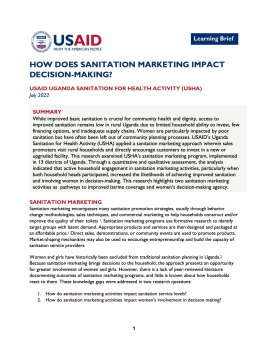While improved basic sanitation is crucial for community health and dignity, access to improved sanitation remains low in rural Uganda due to limited household ability to invest, few financing options, and inadequate supply chains. Women are particularly impacted by poor sanitation but have often been left out of community planning processes. USAID’s Uganda Sanitation for Health Activity (USHA) applied a sanitation marketing approach wherein sales promoters visit rural households and directly encourage customers to invest in a new or upgraded facility. This research examined USHA’s sanitation marketing program, implemented in 13 districts of Uganda. Through a quantitative and qualitative assessment, the analysis indicated that active household engagement in sanitation marketing activities, particularly when both household heads participated, increased the likelihoods of achieving improved sanitation and involving women in decision-making. This research highlights two sanitation marketing activities as pathways to improved latrine coverage and women’s decision-making agency.


